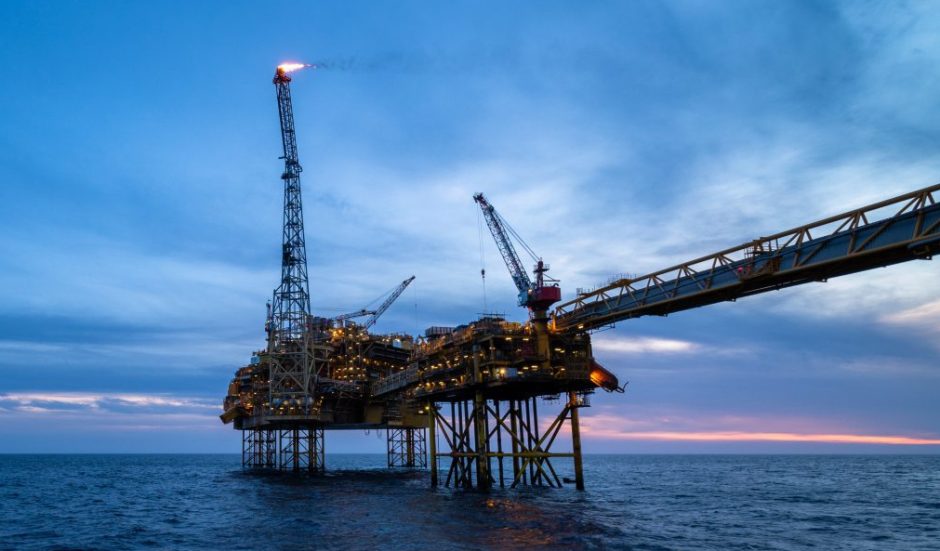
Carbon Capture Storage (CCS) is set to play a vital role in the UK’s drive to net zero.
-
Some Energy Voice online content is funded by outside parties. The revenue from this helps to sustain our independent news gathering. You will always know if you are reading paid-for material as it will be clearly labelled as “Partnership” on the site and on social media channels,
This can take two different forms.
“Presented by”
This means the content has been paid for and produced by the named advertiser.“In partnership with”
This means the content has been paid for and approved by the named advertiser but written and edited by our own commercial content team.
The process of capturing CO2 and storing it permanently in sites such as depleted oil and gas fields miles beneath the UK North Sea will be key to decarbonising sectors that have no other way to reduce emissions.
In 2022, the leading body for the offshore energy sector, Offshore Energies UK (OEUK), reported that CCS could be worth £100bn by 2050, and that the lion’s share of this work could be won by UK businesses with the right action from governments and industry alike.
It’s also an area where the UK has an inbuilt advantage. With its oil and gas heritage and decades of expertise in large-scale engineering feats, the UK will not only make this a viable solution to the climate crisis, but also turn it into an opportunity for growth – for the economy, people, and jobs.
The Government’s recent decision to award 21 licences to 14 companies to permanently store carbon beneath the UK’s shores is a big step towards making CCS a UK success story. The sites could store up to 30 million tonnes of CO2 per year by 2030, approximately 10% of UK annual emissions in 2021.
Members of OEUK are some of the same companies involved in this huge potential market.
The hurdles and opportunities of CCS will be discussed at OEUK’s Decarbonisation Conference this month, which aims to open a dialogue on the low carbon transformation of the UK’s energy system.
Enrique Cornejo, head of energy policy at OEUK, says: “A lot of people think of CCS as a new technology, but actually it’s a proven technology. Norway has been storing CO2 successfully in the Sleipner Field for decades, and in the US they have been capturing CO2 and using it for enhanced oil recovery since the 60s and 70s.
“The supply chain is there; the technology is there. There will be technology improvements needed to reduce costs. But we’re confident, at least for deployment in the UK, that all of the technology is there.”
Challenges and opportunities ahead
Despite this, progress has been slow and we risk falling behind in this all-important arena. Enrique sees a number of reasons for this, one of which is the size of the challenge. But that can be an opportunity as well.
Enrique adds: “I think what is new about CCS is deployment at the size and pace that is required for the UK to reach its targets. At the moment, we only capture about 40 million tonnes of CO2 every year across the world. But according to the International Energy Agency and other forecasts, by 2050 we need to capture and store about 8 gigatons of CO2. So that’s exponential growth enabled by these technologies. The market is going to be huge, and our supply chain has a really important role to play in delivering that.”
Cost is also a factor and something that can deter investment when the price companies pay for generating carbon is much lower. Technology improvements should reduce this, but Enrique still sees government support as vital to kickstart the CCS sector.
He says: “The costs of capturing, transporting, and storing CO2 range from around £100 per tonne to £140. You need to capture the CO2 and then you need to pay for the infrastructure to transport it and store it and those costs are much higher than carbon pricing. Carbon pricing in the UK is about £33 per tonne.
“So, there is a cost gap between carbon pricing and actually deploying the technology, and this is why it is important to get government support.”
Maximising our competitive advantage
Making a success of CCS will bring very clear benefits to the economy. The UK Government has said the sector will directly support 50,000 jobs. But Enrique also points to the technology preserving more than 100,000 jobs by sustaining industries that otherwise couldn’t decarbonise.
There will also be export opportunities for our supply chains with the global CCS market expected to be worth billions of dollars in the next few decades.
We have been fortunate with CCS to have had a head start on many of our competitors. But Enrique believes we have not yet fully taken advantage of that fact.
He adds: “We have 70 gigatons of potential geological storage for CO2. That’s an advantage few other countries in the world have.
“We also have our oil and gas supply chain, so about 90% of the capabilities required to develop this in terms of technologies and skills are already there.
“But the pace has been very slow compared to other markets. I think we have lost that first-mover advantage, especially as the US has accelerated its incentives to install CCS with the Inflation Reduction Act that provides more than $300 billion to push low carbon technologies.
“But we’re still in a good place. I think we’re no longer first movers, but we can continue to be early movers.”
Forging the path ahead
So what needs to happen now?
Enrique says: “What we hear from industry is that the regulatory picture is already very complex. So I think that can be streamlined. There shouldn’t be any unnecessary burdens.
“Earlier this year the Government announced £20 billion of potential support for the sector. But it’s still unclear exactly how this funding is going to be deployed. It’s good to have the headline figure, but we really need the detail.
“We also need a plan to develop offshore infrastructure and for CCS projects to be developed in a wider strategy that incorporates all new energy sources. Because we have already started to see potential issues around offshore wind projects competing for space with CCS projects.”
Other necessary measures include getting clarity from government on the framework for non-pipeline transportation and developing a market for other countries using our CO2 storage capacity.
Enrique adds: “Norway is a really good example of this. It is already developing agreements with other European countries to use its own storage. We need to start thinking about how we compete for that market.
“We need to make the UK an irresistible place to do business and to develop energy transition projects. We have all the right ingredients to make this a success, but that’s not enough if we’re too slow on implementation.
“We have built an industry capable of creating a future built on clean energy. The UK is in a global race for the investment to make that future a reality and it is critical that it wins.”
The Decarbonisation Conference will be held at The P&J Live on October 12. Learn more about OEUK and its work.
Recommended for you

 © Supplied by Shutterstock
© Supplied by Shutterstock